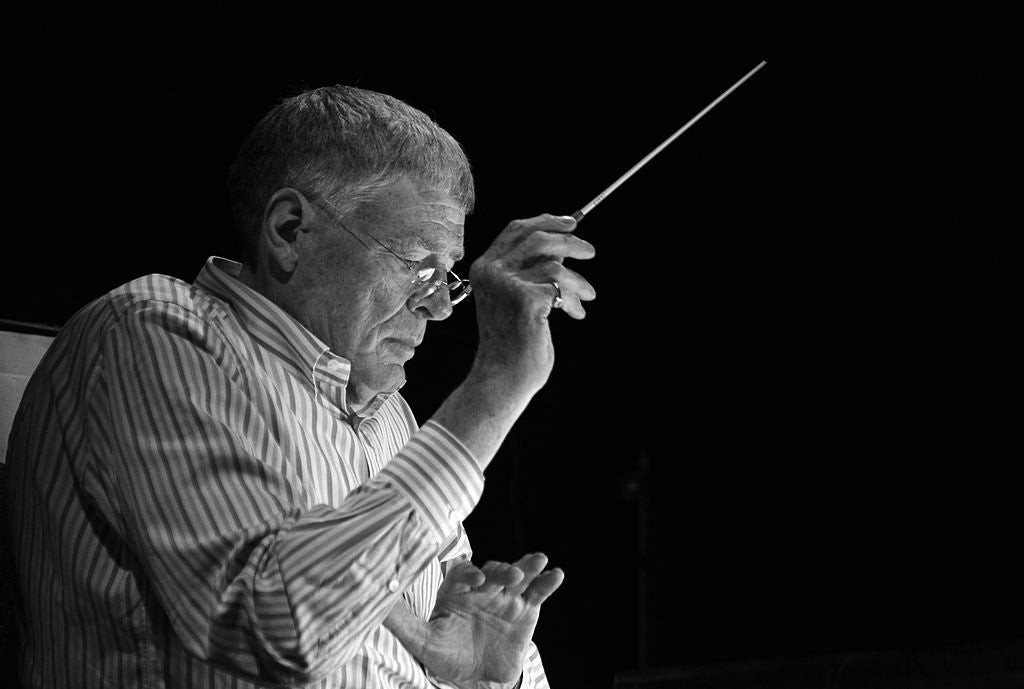Sir Jeffrey Tate, obituary: Royal Opera House conductor who far outlived spina bifida prognosis
Beginning his career as an eye doctor, his passion for music eventually shone through and he began working at London Opera Centre where conducting became a therapy for his ill health

Your support helps us to tell the story
As your White House correspondent, I ask the tough questions and seek the answers that matter.
Your support enables me to be in the room, pressing for transparency and accountability. Without your contributions, we wouldn't have the resources to challenge those in power.
Your donation makes it possible for us to keep doing this important work, keeping you informed every step of the way to the November election

Andrew Feinberg
White House Correspondent
When he was a boy, suffering from spina bifida and kyphosis, or curvature of the spine, Jeffrey Tate was told he would not live beyond 50. He outlived the prognosis by nearly a quarter of a century and became principal conductor of the Royal Opera House in Covent Garden and the English Chamber Orchestra.
He was born in Salisbury in 1943 and grew up in Farnham. He spent extended spells in hospital as child but showed early musical talent. “My parents bearded my music teacher in his den one day and asked him what I could do in music,” he recalled. “I was a good but not brilliant pianist, an indifferent cellist, and I could sing. He told them: ‘I know he’s very musical, but how he could earn his money, I have no idea.’
“And that wasn’t good enough. I had a great sense of debt to medicine. I realised I was an ambulant creature because of what science had done for me, so I got into Cambridge on a state scholarship to become a doctor.” He embarked on a career in eye surgery at St Thomas’s Hospital in London.
Music remained his passion, however, and he even failed one of his exams through spending too much time playing piano at an opera workshop. He decided to take the musical plunge and got a job at the London Opera Centre. A stint at the Royal Opera House followed, working with Georg Solti, and then Bayreuth, where he assisted Pierre Boulez in the 1970s with his groundbreaking production of the Ring Cycle.
He went on to conduct his own Ring in Paris in 1994, and more than 20 others followed. Germany, he said, was his spiritual home: “Whatever the politics seem to be there, culture is always very central,” he said. It is fair to say he fell out of love with Britain and its “narrow-minded parochialism,” and he was better known abroad than at home: “In Vienna, taxi drivers actually recognise you and say, ‘Mr Tate, maestro, how nice to see you’,” he remarked in 2013.
Tate, who was knighted in the 2017 New Year’s Honours list, was partner to Klaus Kuhlemann, a German geomorphologist who he met in 1977 when he was conducting in Cologne. “The gay world is immensely hung up with physical perfection for some curious reason,” he said, “therefore, being disabled in that world is harder.”
Tate, who died after collapsing in an art gallery in Bergamo in Italy, suffered many bouts of ill-health, including legionnaires’ disease. “A doctor said to me that the reason I survived these experiences was that I’ve had to fight all my life, because of my disability,” he said.
But conducting, he maintained, was therapeutic: “I frequently find after a rehearsal of a performance that I have more breath, and can walk better and climb stairs better than I could before. Basically speaking, conducting is quite a healthy profession.”
Jeffrey Philip Tate, born 28 April 1943; died 2 June 2017
Subscribe to Independent Premium to bookmark this article
Want to bookmark your favourite articles and stories to read or reference later? Start your Independent Premium subscription today.
Join our commenting forum
Join thought-provoking conversations, follow other Independent readers and see their replies
Comments